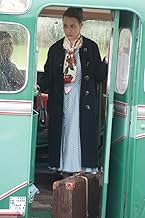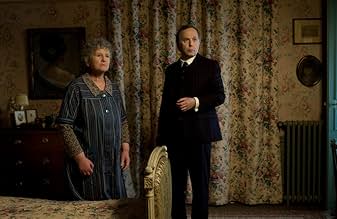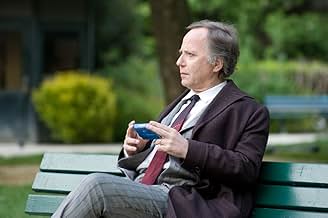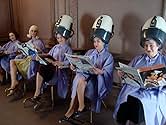IMDb रेटिंग
7.1/10
11 हज़ार
आपकी रेटिंग
1960 के दशक के पेरिस में, एक रूढ़िवादी दंपती का जीवन स्पेनिश नौकरानियों के एक समूह द्वारा अस्त-व्यस्त हो जाता है जो इसी इमारत में रहते हैं.1960 के दशक के पेरिस में, एक रूढ़िवादी दंपती का जीवन स्पेनिश नौकरानियों के एक समूह द्वारा अस्त-व्यस्त हो जाता है जो इसी इमारत में रहते हैं.1960 के दशक के पेरिस में, एक रूढ़िवादी दंपती का जीवन स्पेनिश नौकरानियों के एक समूह द्वारा अस्त-व्यस्त हो जाता है जो इसी इमारत में रहते हैं.
- निर्देशक
- लेखक
- स्टार
- पुरस्कार
- 2 जीत और कुल 3 नामांकन
फ़ीचर्ड समीक्षाएं
Philippe Le Guay and Fabrice Luchini, two names that go together well, are more than ever synonymous with good quality comedy. If you want to have a good time, feel free to see the three films they collaborated on: "L'année Juliette" (1995), in which Luchini makes his life awfully complicated by inventing himself a mistress ; "Le coût de la vie" (2003), where Luchini makes his life ... awfully complicated by being too tight-fisted ; and coming now "Les femmes du 6e étage" (2010), with Luchini in yet another funny role in yet another well- written comedy signed Le Guay.
This time Luchini is Jean-Louis Joubert, a Parisian stockbroker. Like Camille in "L'année Juliette" and Brett in "Le coût de la vie", the character he joyfully slips into is very imperfect and his defects and shortcomings are a sure source of laughter but, unlike in the two former films, Camille will evolve and open up to his true self, making him a more engaging hero than usual. The beginning of the movie illustrates to great effect the imperfect Jean-Louis living his regular but restricted life in his spacious luxury apartment. He is married to a stiff-necked socialite named Suzanne and has two arrogant teenage sons who, being boarders, are currently away from home. The climaxes of his life, besides making money out of thin air, are eating a perfectly cooked soft-boiled egg and being bullied by his old Breton maid. But things start changing once Suzanne hires Maria, a charming young Spanish maid. For some reason some day Jean-Louis follows Maria up the stairs to the sixth floor and discovers a "terra incognita", in other words the maid's rooms below the roofs and the strange people who inhabit them, a handful of female Spanish immigrants. Against all odds this reactionary grand bourgeois develops an instant liking for these women and for their civilization. And of course, he will fall for Maria, but not only because she is pretty, mainly because she belongs to the new world he has just discovered.
A feel good movie in a way, "Les femmes du 6e étage" is much more than just that. It is also and none the less a committed film which, although set in the 1960s, denounces evils still plaguing today's society like, for example, the appalling way immigrants are exploited by their employers and ill-thought of by a majority of the natives of their "home" country, the selfishness of tourists who will not know about the political and social situation of the countries where they spend their holidays (1962's Spain can be replaced in the 2000s by Cuba, Egypt, Tunisia and many other countries)... Conversely the film is a call for tolerance and open-mindedness, for listening to one's heart rather than one's interest. But be reassured, this dimension, although crucial, remains underlying. There are no such things as preaching or political slogans, only a fine cocktail of good acting and tender humor. And sincerity. Did you know that for that matter that Philippe Le Guay had a Spanish maid when he was a kid and that his father was a broker just like Jean-Louis? Did you know that the actresses playing the maids are all Spanish and that some of them do not even speak French? That Luchini did not know a word of Spanish before starting the film? All these facts are good points which contribute to a welcome feeling of authenticity that enhances the film.
To come back to Fabrice Luchini, he is at his best in "Les femmes du 6e étage" for two reasons: first because his character is three-dimensional and goes beyond caricature (if Jean-Louis is stiff, haughty and narrow-minded it is because he reproduces the values inculcated in him both by his parents and by his social class, not because he is rotten to the core) ; second because Fabrice shows the necessary restraint quite in keeping with the role. The result is just perfect. And the rest of the cast is on the par with him: Natalia Verbeke, fresh and adorable as Luchini's love interest ; Sandrine Kiberlain, excellent as Luchini's uptight but not so superficial wife ; and the impeccable ensemble of Spanish actresses, including Carmen Maura and Lola Dueñas (two Almodovar fixtures), Berta Ojea, Nuria Solé and Concha Galan, as the servants from Spain. Also to be acclaimed are Annie Mercier as the spiteful janitor and gloomy-faced Philippe du Janerand as Piquer, Luchini's right-hand man.
Intelligent, sensitive and funny, "Les femmes du 6e étage", the third effort of the winning duo Le Guay-Luchini", deserves its success at the box-office and will not disppoint you.
This time Luchini is Jean-Louis Joubert, a Parisian stockbroker. Like Camille in "L'année Juliette" and Brett in "Le coût de la vie", the character he joyfully slips into is very imperfect and his defects and shortcomings are a sure source of laughter but, unlike in the two former films, Camille will evolve and open up to his true self, making him a more engaging hero than usual. The beginning of the movie illustrates to great effect the imperfect Jean-Louis living his regular but restricted life in his spacious luxury apartment. He is married to a stiff-necked socialite named Suzanne and has two arrogant teenage sons who, being boarders, are currently away from home. The climaxes of his life, besides making money out of thin air, are eating a perfectly cooked soft-boiled egg and being bullied by his old Breton maid. But things start changing once Suzanne hires Maria, a charming young Spanish maid. For some reason some day Jean-Louis follows Maria up the stairs to the sixth floor and discovers a "terra incognita", in other words the maid's rooms below the roofs and the strange people who inhabit them, a handful of female Spanish immigrants. Against all odds this reactionary grand bourgeois develops an instant liking for these women and for their civilization. And of course, he will fall for Maria, but not only because she is pretty, mainly because she belongs to the new world he has just discovered.
A feel good movie in a way, "Les femmes du 6e étage" is much more than just that. It is also and none the less a committed film which, although set in the 1960s, denounces evils still plaguing today's society like, for example, the appalling way immigrants are exploited by their employers and ill-thought of by a majority of the natives of their "home" country, the selfishness of tourists who will not know about the political and social situation of the countries where they spend their holidays (1962's Spain can be replaced in the 2000s by Cuba, Egypt, Tunisia and many other countries)... Conversely the film is a call for tolerance and open-mindedness, for listening to one's heart rather than one's interest. But be reassured, this dimension, although crucial, remains underlying. There are no such things as preaching or political slogans, only a fine cocktail of good acting and tender humor. And sincerity. Did you know that for that matter that Philippe Le Guay had a Spanish maid when he was a kid and that his father was a broker just like Jean-Louis? Did you know that the actresses playing the maids are all Spanish and that some of them do not even speak French? That Luchini did not know a word of Spanish before starting the film? All these facts are good points which contribute to a welcome feeling of authenticity that enhances the film.
To come back to Fabrice Luchini, he is at his best in "Les femmes du 6e étage" for two reasons: first because his character is three-dimensional and goes beyond caricature (if Jean-Louis is stiff, haughty and narrow-minded it is because he reproduces the values inculcated in him both by his parents and by his social class, not because he is rotten to the core) ; second because Fabrice shows the necessary restraint quite in keeping with the role. The result is just perfect. And the rest of the cast is on the par with him: Natalia Verbeke, fresh and adorable as Luchini's love interest ; Sandrine Kiberlain, excellent as Luchini's uptight but not so superficial wife ; and the impeccable ensemble of Spanish actresses, including Carmen Maura and Lola Dueñas (two Almodovar fixtures), Berta Ojea, Nuria Solé and Concha Galan, as the servants from Spain. Also to be acclaimed are Annie Mercier as the spiteful janitor and gloomy-faced Philippe du Janerand as Piquer, Luchini's right-hand man.
Intelligent, sensitive and funny, "Les femmes du 6e étage", the third effort of the winning duo Le Guay-Luchini", deserves its success at the box-office and will not disppoint you.
A great review by Robert Beames (coulden't have done it better myself!!) It has been given the more toner-friendly English language title of Service Entrance, but comic French drama Les Femmes Du 6eme Etage translates literally as The Women on the 6th Floor. Shown out of competition in Berlin, the film was very warmly received thanks in part to the performances of its sweet and amiable leading man, Fabrice Luchini, and its beautiful Spanish leading lady played by Natalia Verbeke. These actors combine with the film's leisurely pacing and entertaining scenario to ensure that it is a winsome and inoffensive crowd-pleaser.
The film, set in the 1960s, follows a wealthy, middle-aged Parisian stockbroker named Jean-Louis (Luchini) whose long-standing maid quits following a row with his demanding wife Suzanne (Sandrine Kiberlain). Unable to clean up after themselves, the couple desperately need a new maid. But when Suzanne's high society friends insist French maids aren't the done thing anymore, she enlists the help of Maria (Natalia Verbeke), a feisty, young Spanish immigrant. Jean-Louis forms an instant and obsessive attraction to her and to all things Spanish, soon striking up unlikely friendships with all the Spanish ladies who live in the servant's quarters above his home – a place he knows nothing about despite living in the building his entire life. Worlds collide and good-natured japes ensue as he helps each lady adjust to life in France whilst himself inheriting a new found love of life.
I don't think it's necessarily a coincidence that both the more shamelessly enjoyable films I've seen here up to now have been broad comedies about cultural difference and histories of mass immigration – with Almanya looking at German-Turks and Service Entrance exploring the relationship, and the comedy that comes of misunderstanding, between the French and their Spanish workforce. Immigration is still a political hot potato issue in these countries, as it remains in much of Europe, and maybe light-hearted comedy is seen as the best way to preach tolerance, reaching a bigger audience than earnest polemic. In mocking bigotry and by setting it in the past (as an old fashioned attitude) perhaps it is felt that people might be less inclined to identify with those views.
In any case both films are funny and have their hearts firmly in the right place. This French offering is gentler and less ballsy than it's Turkish-German counterpart, but no less enjoyable. The character of Jean-Louis is incredibly easy to like, being child-like in his enthusiasm for his new-found interest in Spain. The character of Suzanne is also refreshingly balanced and nuanced. She'd usually be a two-dimensional figure we would be encouraged to dislike in order to make it permissible for Jean-Louis to consider romance with Maria and yet the film doesn't go down that route: she can be annoying and insensitive but she isn't a nasty person. Maria and the other Spanish ladies are also a joy to watch as they interact with one another and fuss over cheerful little Jean-Louis.
Service Entrance is the filmic equivalent of a soufflé and certainly not a tough watch typical of the standard festival fare. Indeed it falls into the dubious realm of the "feel good" movie. But sandwiched, as it is here, between two-hour long Shakespeare adaptations, Bela Tarr movies, Argentinian slow cinema and films about nuclear disasters, it is exactly the kind of film you need to see in order to keep sane. It is difficult to say whether wider criticism in France will be anything like as positive when removed from this context on theatrical release, but here it offered exactly what was needed and nobody appreciated that more than I.
The film, set in the 1960s, follows a wealthy, middle-aged Parisian stockbroker named Jean-Louis (Luchini) whose long-standing maid quits following a row with his demanding wife Suzanne (Sandrine Kiberlain). Unable to clean up after themselves, the couple desperately need a new maid. But when Suzanne's high society friends insist French maids aren't the done thing anymore, she enlists the help of Maria (Natalia Verbeke), a feisty, young Spanish immigrant. Jean-Louis forms an instant and obsessive attraction to her and to all things Spanish, soon striking up unlikely friendships with all the Spanish ladies who live in the servant's quarters above his home – a place he knows nothing about despite living in the building his entire life. Worlds collide and good-natured japes ensue as he helps each lady adjust to life in France whilst himself inheriting a new found love of life.
I don't think it's necessarily a coincidence that both the more shamelessly enjoyable films I've seen here up to now have been broad comedies about cultural difference and histories of mass immigration – with Almanya looking at German-Turks and Service Entrance exploring the relationship, and the comedy that comes of misunderstanding, between the French and their Spanish workforce. Immigration is still a political hot potato issue in these countries, as it remains in much of Europe, and maybe light-hearted comedy is seen as the best way to preach tolerance, reaching a bigger audience than earnest polemic. In mocking bigotry and by setting it in the past (as an old fashioned attitude) perhaps it is felt that people might be less inclined to identify with those views.
In any case both films are funny and have their hearts firmly in the right place. This French offering is gentler and less ballsy than it's Turkish-German counterpart, but no less enjoyable. The character of Jean-Louis is incredibly easy to like, being child-like in his enthusiasm for his new-found interest in Spain. The character of Suzanne is also refreshingly balanced and nuanced. She'd usually be a two-dimensional figure we would be encouraged to dislike in order to make it permissible for Jean-Louis to consider romance with Maria and yet the film doesn't go down that route: she can be annoying and insensitive but she isn't a nasty person. Maria and the other Spanish ladies are also a joy to watch as they interact with one another and fuss over cheerful little Jean-Louis.
Service Entrance is the filmic equivalent of a soufflé and certainly not a tough watch typical of the standard festival fare. Indeed it falls into the dubious realm of the "feel good" movie. But sandwiched, as it is here, between two-hour long Shakespeare adaptations, Bela Tarr movies, Argentinian slow cinema and films about nuclear disasters, it is exactly the kind of film you need to see in order to keep sane. It is difficult to say whether wider criticism in France will be anything like as positive when removed from this context on theatrical release, but here it offered exactly what was needed and nobody appreciated that more than I.
Fabrice Lucchini, famous French actor well-known for his flamboyant demeanour, is playing an invisible man in this film, which placed in Paris in the 1960's. He opens up to life while meeting the group of Spaniard maids living above his apartment. His wife, played by Sandrine Kiberlain, disagree with him because he's talking to these people who are not from the same social class. Both Lucchini and Kiberlain are very good in this film. The actress who's playing Maria Gonzalez cast, Natalia Verbeke, is offering a splendid performance. I've never seen her playing before. The end of the movie is quite common and deceiving, but it's doesn't erase the fun we had watching this very niece movie.
The nice thing about "The Women on the 6th Floor" is that it stops itself just short of being an important film with a big statement. I can't help but think of it as a lighter cousin to "The Help"; while "The Help" shoved its self-righteous social consciousness right into the viewer's face, this French comedy chooses to remain a silly romantic comedy and keep the social commentary as subtext. The wealthy protagonist isn't out to change world orders, and he really isn't all that progressive (like Emma Stone's character in The Help), he just wants to get into the Spanish maid's pants. That means the movie got a lot less attention (and would have even if we eliminated the element of Americans' strange refusal to read subtitles) but it's a lot more entertaining, a lot less irritating, and not any more shallow as far as social commentary goes.
It isn't quite a great film. It's very naive, very unrealistic, and French cinema buffs may point out that it's a throwback to films made over half a century ago. The Spanish characters are extremely stereotypical, and the romance makes less and less sense as the film goes on, most jarringly in the incredibly silly, entirely unconvincing, saccharine ending, which almost ruined the whole thing for me. Nevertheless, it's funny and enjoyable throughout, Fabrice Luchini is superb in the lead, and all the supporting characters (even the stereotypical maids) are wonderfully crafted. And interestingly, it's the ignoble motivation of the protagonist that makes him much more compelling than Emma Stone in "The Help"; as unrealistic as the story is, the character is quite real, and makes for a delightful comedic protagonist, which in turns leads to a delightful little movie.
It isn't quite a great film. It's very naive, very unrealistic, and French cinema buffs may point out that it's a throwback to films made over half a century ago. The Spanish characters are extremely stereotypical, and the romance makes less and less sense as the film goes on, most jarringly in the incredibly silly, entirely unconvincing, saccharine ending, which almost ruined the whole thing for me. Nevertheless, it's funny and enjoyable throughout, Fabrice Luchini is superb in the lead, and all the supporting characters (even the stereotypical maids) are wonderfully crafted. And interestingly, it's the ignoble motivation of the protagonist that makes him much more compelling than Emma Stone in "The Help"; as unrealistic as the story is, the character is quite real, and makes for a delightful comedic protagonist, which in turns leads to a delightful little movie.
Thank goodness I got tired of the trash that Hollywood tips out like churned mince through a mincer and decided to begin watching foreign films!
French movies, in particular, seem to have a knack for producing a love story that doesn't leave me puking with either boredom or the sheer stupidity and bad acting.
This is one such little gem. Delightful, understated, charming. When a Spanish maid moves to France she takes a job with a wealthy businessman and his detached wife. As the wife listens more and more to her malicious, gossipy society friends, she becomes suspicious of her husband having an affair.
Her husband certainly is up to many things, but he's a lovely man, played delightfully, and he's falling in love alright... with a whole new way of life.
I enjoyed every minute of this!
French movies, in particular, seem to have a knack for producing a love story that doesn't leave me puking with either boredom or the sheer stupidity and bad acting.
This is one such little gem. Delightful, understated, charming. When a Spanish maid moves to France she takes a job with a wealthy businessman and his detached wife. As the wife listens more and more to her malicious, gossipy society friends, she becomes suspicious of her husband having an affair.
Her husband certainly is up to many things, but he's a lovely man, played delightfully, and he's falling in love alright... with a whole new way of life.
I enjoyed every minute of this!
क्या आपको पता है
- ट्रिवियाPhilippe Le Guay took inspiration from his own childhood. His father was a stockbroker like Jean-Louis Joubert in the film and he himself had a Spanish maid.
- गूफ़In the street, most (if not all) men wear hats, caps or Basque berets. In France, most men stopped wearing headgear in the 1950s (in cities at least). By 1960, the vast majority of men were hatless.
- कनेक्शनFeatured in Ebert Presents: At the Movies: एपिसोड #2.13 (2011)
- साउंडट्रैकItsi Bitsi, Petit Bikini
(Itsy Bitsy Teenie Weenie Yellow Polkadot Bikini)
Music by Lee Pockriss
English lyrics by Paul Vance
French lyrics by Lucien Morisse and André Salvet
Performed by Dalida
© Emily Music Corporation and Music Sales Corporation
Avec l'aimable autorisation de Campbell Connelly France
(P) 1960 Barclay
Avec l'autorisation de Universal Muis Vision
टॉप पसंद
रेटिंग देने के लिए साइन-इन करें और वैयक्तिकृत सुझावों के लिए वॉचलिस्ट करें
- How long is The Women on the 6th Floor?Alexa द्वारा संचालित
विवरण
- रिलीज़ की तारीख़
- कंट्री ऑफ़ ओरिजिन
- आधिकारिक साइटें
- भाषाएं
- इस रूप में भी जाना जाता है
- The Women on the 6th Floor
- फ़िल्माने की जगहें
- उत्पादन कंपनियां
- IMDbPro पर और कंपनी क्रेडिट देखें
बॉक्स ऑफ़िस
- बजट
- €70,00,000(अनुमानित)
- US और कनाडा में सकल
- $7,19,823
- US और कनाडा में पहले सप्ताह में कुल कमाई
- $26,200
- 9 अक्टू॰ 2011
- दुनिया भर में सकल
- $2,75,33,970
- चलने की अवधि1 घंटा 42 मिनट
- रंग
- ध्वनि मिश्रण
- पक्ष अनुपात
- 1.85 : 1
इस पेज में योगदान दें
किसी बदलाव का सुझाव दें या अनुपलब्ध कॉन्टेंट जोड़ें


![Bande-annonce [OV] देखें](https://m.media-amazon.com/images/M/MV5BNTdmOTBjM2UtOTUyMS00NDViLWI4NWEtNmVhODc1NDVjN2NlXkEyXkFqcGdeQXRyYW5zY29kZS13b3JrZmxvdw@@._V1_QL75_UX500_CR0)



























